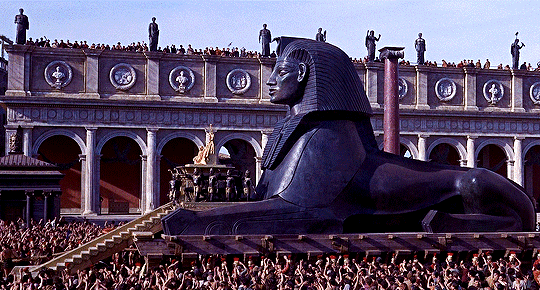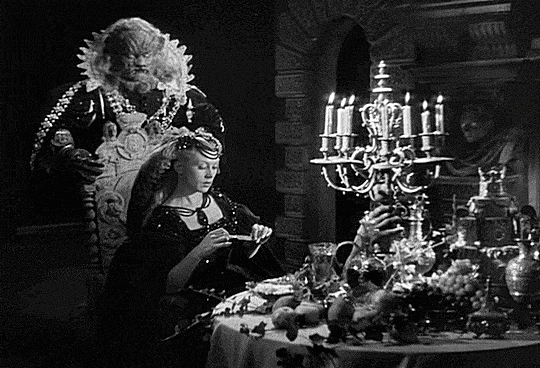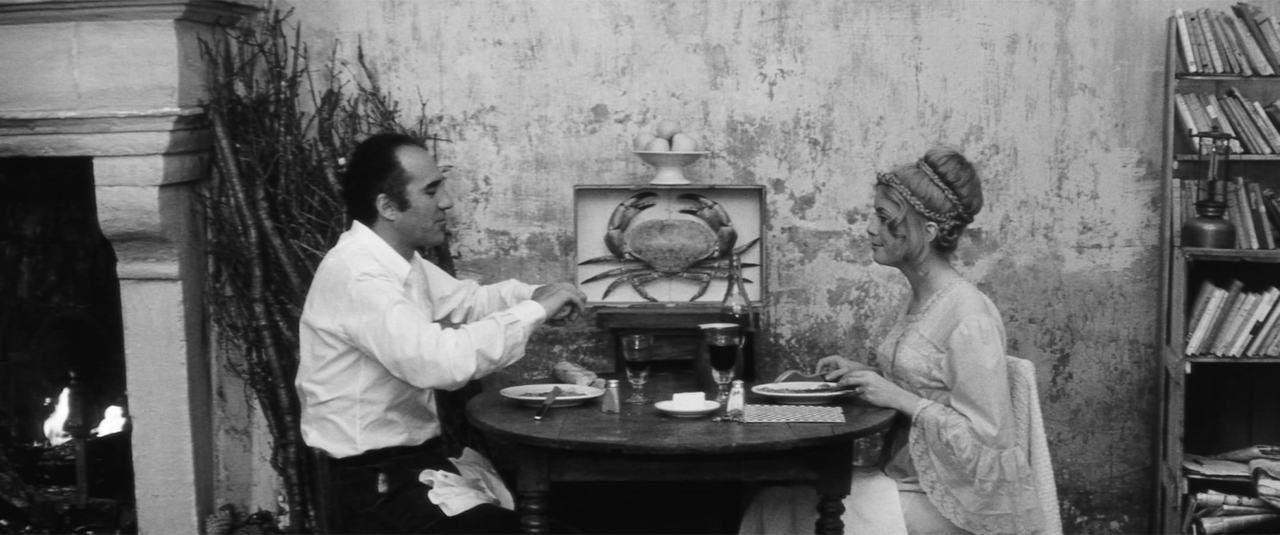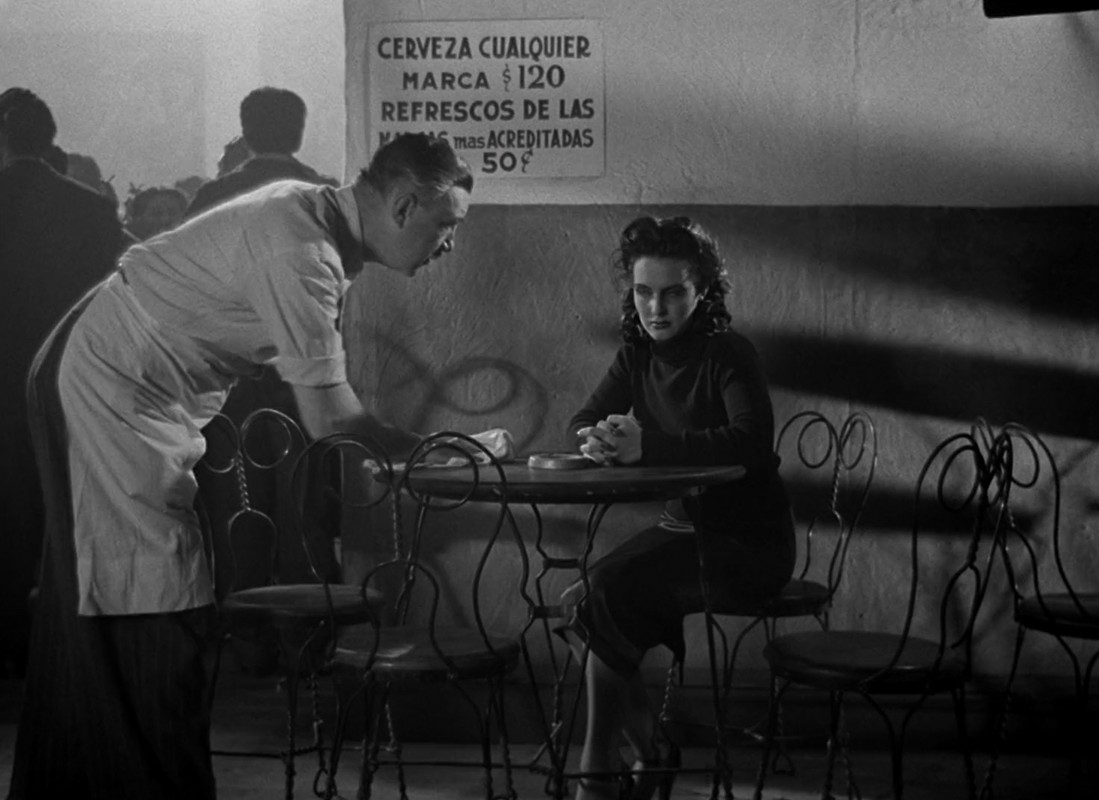鉄輪 [Kanawa / The Iron Crown] (Kaneto Shindō, 1972)
Sep
20
fried eggs

Meg Flower as the young woman eats a fried egg straight from a spatula. She's naked. DP: Kiyomi Kuroda.
romance
Zupa [Soup] (Zbigniew Rybczyński, 1975)
Aug
27
Crab Soup Day

The husband eating soup. The colours are extremely bright and placed on top of animated black-and-white still photographs created with an optical printer. DP: Zbigniew Rybczyński..
Zbigniew Rybczyński's autobiographical Zupa follows an unnamed couple's faltering monotonous relationship.
Produced by the groundbreaking Se-ma-for Studios in Łódź – you may be familiar with their 1981 Oscar-winning Tango by, again, Rybczyński – the story is told through colourised analogue still #photography and electronic music and sound effects created by PRES's Eugeniusz Rudnik.
“There are never enough hours in the days of a queen, and her nights have too many.” Cleopatra (Joseph L. Mankiewicz + Rouben Mamoulian, 1963)
Aug
26
National Spark The World Day

Cleopatra's – Elizabeth Taylor, anachronistically dressed as the goddess Nekhbet – grande entrée in Rome. She sits on top of a black, basalt-like sphinx, pulled by numerous slaves and greeted by a cast of thousands. There are 20 000 Italian extras; there's no CGI. DPs: Leon Shamroy & Jack Hildyard.
Like Rome, Cleopatra wasn't built in a day. Joseph L. Mankiewicz's epic studio breaker took six years to make and, despite it being the highest-grossing film of 1963, didn't break even until 1973. Was it a #flop? A classic flop but a flop nevertheless?
– Cleopatra
The star – the Queen – Elizabeth Taylor demanded an unprecedented one million dollar fee, 10,3 million in 2023 US dollars. Liz's movie dressing table hold trinkets especially designed by luxury brand Bulgari, blink and you'll miss them. The Pharaoh's lavish costumes, all 65 of them (created by Irene Sharaff who would dress Taylor again as #Cleopatra's counterpart Martha in Who's Afraid of Virginia Woolf? (1966)), cost almost 195K dollar (ca. 2 million today), and of course those 20 000 extras, shipped from God-knows-where to Hollywood on the Tiber to shoot one scene, had to look like their 2000 year old counterparts, and be fed, and housed.
Is it all bad? Cleopatra is one of those movies that so many – and that includes obsessive cinephiles – will get around to watch. Eventually. All four hours of it. I'm still holding out, but ooh, the spectacle!
Hell Bound (William J. Hole Jr., 1957)
Aug
20
milk

Stanley Thomas (George E. Mather) and Daddy (Dehl Berti) in a sleazy nightclub. Daddy raises his glass of milk to someone offscreen. DP: Carl E. Guthrie.
Hell Bound (William J. Hole Jr., 1957)
Aug
20
International Day Of Medical Transporters

Paula (June Blair) and Eddie (Stuart Whitman) in nurses' uniforms taking care of an injured child on the street. Behind them, two cops unload a stretcher from an ambulance. DP: Carl E. Guthrie.
The boss' girlfriend falls for an ambulance driver, derailing her man's gang's carefully planned narcotics heist.
Maléfices [Where the Truth Lies] (Henri Decoin, 1962)
Aug
16
milk

Ronga (Maîthé Mansoura accompanied by cheetah Nyète), sits on a straw-covered floor while holding a bowl with milk. There are potted plants and gardening equipment is placed against the wall. DP: Marcel Grignon.
– Does he crawl on four legs? What does he eat and drink? – I've given him water to drink on occasion. He would never eat me.La Belle et la Bête [Beauty and the Beast] (Jean Cocteau + René Clément, 1946)
Aug
15
a cornucopia of wonder

La Belle (Josette Day) at a fancy table stacked with good foods and nice wines. She's cleaning her fingernails with the silverware while a chagrined Bête (Jean Marais) looks on. As magical as the story are the production and set design by Christian Bérard, Lucien Carré, and René Moulaert. They breathed a soul into almost everything, including the candelabras. DP: Henri Alekan.
Les créatures [The Creatures] (Agnès Varda, 1966)
Aug
14

Edgar (Michel Piccoli) and Mylène (Catherine Deneuve) all dressed up for a home-cooked meal. On the wall behind them a huge framed mounted crab. DPs: Willy Kurant, William Lubtchansky & Jean Orjollet.
Salón México (Emilio Fernández, 1949)
Aug
13
$120 cerveza

Mercedes (Marga López) sitting at a small round table at the salón. A waiter just came over to take her order. In the other room, meticulously dressed couples dance to live music. DP: Gabriel Figueroa.
“Now I may die content, for I have seen great love.”Michael [Mikaël / Chained: The Story of the Third Sex / Heart's Desire] (Carl Theodor Dreyer, 1924)
Aug
3
National Michael Day

Art critic Switt (Robert Garrison) with muse Michael (Walter Slezak). DPs: Karl Freund & Rudolph Maté.
Considered one of the earliest positive cinematic depictions of (male) homosexuality, Carl Theodor Dreyer's Michael tells the story of lonely artist Zoret (director Benjamin Christensen), his bright young muse and model Michael (Walter Slezak), and the more mature art critic Switt (Robert Garrison). Though it's mostly suggested – there's a female temptress (Nora Gregor) assuming a heterosexual perspective – its motif of the spoken and unspoken relationship between the men is definitely one of love, much in the same way Charles Vidor's Gilda (1946) is.
– opening title card
Michael is the second book adaption of Herman Bang's Mikaël (1902) after Vingarne [The Wings] (Mauritz Stiller, 1916).